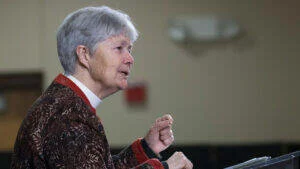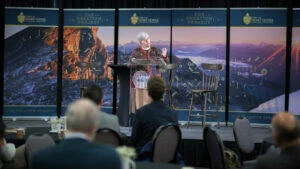Theological education in America is undergoing a series of transmutations. Many divinity schools are shrinking. In some programs, online education has largely displaced the traditional in-person classroom. Modular programs are more commonplace, even for research doctorates. Outside of the academy, a growing number of local churches are pursuing a more robust theological education in-house, some partnering with seminaries to grant an accredited degree.
Not all of these trends are negative. Online and modular delivery methods can provide needed flexibility for those already in ministry. Videoconferencing apps such as Zoom can, in some measure, approximate an in-person experience. And, certainly, when local churches take theological education seriously, it is a most welcome development.
Nevertheless, I am convinced that the traditional divinity school or seminary context provides the optimal venue for those training for ministry, provided its students are also simultaneously engaged as covenant members of local churches. The theological disciplines require great effort and commitment from those who would learn them. They require great skill, expertise, and experience from those who would teach them. A robust program of theology and ministry requires training in the biblical languages, biblical history and literature, biblical theology, systematic theology, church history and historical theology, philosophy, ethics, pastoral counseling, preaching, teaching, and more. Few churches are equipped to provide the kind of expertise needed to achieve this rigor. Even when newer delivery methods can mitigate against some limitations, nothing can replace the embodied experience of a learning community where skilled professors teach eager students in a communal context of instruction, inspiration, prayer, and worship. The divinity school, thus, serves as a partner and support to local churches in their efforts to train the next generation of gospel ministers.
In these perilous times (and all times are perilous before that great and terrible day of the Lord), we stand in need of a renewal of theological education that is centered on the word of God, interpreted and applied in the context of the church (both local and universal), with a view to the theological and moral formation of the minister and those to whom he or she ministers. In short, theological education exists to form a theological habitus, a virtuous disposition, in its students as they follow Christ and preach his word.
The notion of habitus as a virtuous disposition goes back to Aristotle and was employed by Thomas Aquinas, as well as by many Protestant theologians. The philosopher Olav Eikeland (The Ways of Aristotle), defines habitus as follows:
In Aristotelian terms an ethical or intellectual virtue in human beings is a héxis, or habitus (the Latin translation), which means an acquired ability, skill, habit, or incorporated disposition for acting and feeling in certain ways, resulting from practice, exercise, or habituation, as Aristotle points out. A habitus can be either bad or good, but virtue is the best habitus within its kind of activity. Every ethical and intellectual virtue or aretê is the result of a process of perfection (teleíôsis) from within a specific field or activity.
Interestingly, the book of Hebrews frames theological growth in these very terms (Heb 5:13). The theologically mature (teleiōn) are those who have their cognitive capacities trained through practice or habit (hexis). They build upon the elementary and foundational doctrines of the Christian faith and press on toward theological maturity and completion (Heb 6:1–3).
Theological education, then, is habitus formation in a Christian mode: it aims to produce in its students intellectual and moral virtue through certain curricular and extracurricular practices, both theological and spiritual, taught and modeled by faithful professors. Obviously, the means are not foolproof. Professors and administrators can only do so much. The students must bring to the equation their own studiousness, docility, and compunction. They must be willing to “study to shew thyself approved” (2 Tim 2:15 AV), and they must be open to having their minds shaped and their consciences pricked by the word of God.
But from the institutional side of the equation, what kinds of elements should be included in theological education in order to produce this theological habitus? Virtue formation in the Christian religion is ordered to the word of God. It especially employs the ear as the primary organ of religion through a humble and faithful listening to the voice of Christ in the pages of Holy Scripture. It invites students, with Mary of Bethany, to choose the “better part”: sitting at the feet of the Master, heeding his life-changing message. Only then can students, like Martha, rise to serve the faithful. The divinity school serves as a conduit for the word of Christ in several ways.
What kinds of elements should be included in theological education in order to produce this theological habitus?
First, theological education trains students to study the word of God. As a Protestant (and specifically Baptist) theologian, I remain convinced that the Scriptures of the Old and New Testaments are the only inspired and infallible, written revelation of God. The Scriptures have pride of place in Christian faith and practice and must retain this special status in the divinity school. Students must learn the biblical languages so that they can engage with God’s revelation in its unmolested form. They must learn biblical history and literary structures, genres, and idioms so that they can faithfully interpret the literal sense of the text. The tools of critical scholarship have a place in this training, but they must never be taught in such a way that the unique theological character of Scripture is eclipsed. The overarching storyline of Scripture must also be taught so that students can locate each text’s proper place in the covenantal development of the whole canon, which finds is scope and telos in the definitive revelation of God in Jesus Christ. Reading the Bible Christologically is the hermeneutical key that unlocks all of the treasures of divine knowledge (Luke 11:52). Protestants need not fear or dismiss the patristic and medieval practice of reading Scripture in its pluriform sense: on the basis of the literal sense we can also discern Scripture’s allegorical (Christological) import, its tropological (moral) implications, and its anagogical (forward looking and upward looking) end.
Second, theological education equips students to interpret and synthesize the word of Christ by faithfully attending to what Thomas Oden called the “consensual tradition.” Modern technical commentaries provide undeniable benefits to the biblical interpreter, but the riches of the history of interpretation should not be overlooked. The ancient ecumenical creeds and councils and the insights of theological luminaries in church history provide the indispensable interpretive framework for reading Holy Scripture in the communion of saints. For the Protestant theologian, the tradition does not serve as a second source of revelation alongside Scripture, but it does function as a derivatively authoritative guide (normed by Scripture) to interpreting, synthesizing, and defending the biblical teaching. Attending to Scripture, tradition, and Christian experience, dogmatic theology, then, forms the capstone of theological formation. It seeks a conceptual, comprehensive (in terms of its sources, not in terms of its incomprehensible Subject), coherent, and constructive account of biblical doctrine for the unique needs of the present moment.
The tradition does not serve as a second source of revelation alongside Scripture, but it does function as a derivatively authoritative guide (normed by Scripture) to interpreting, synthesizing, and defending the biblical teaching.
Third, theological education models best practices in teaching and applying the word of Christ to the practical needs of the church and the world. Theology is both a theoretical and a practical science. It is both contemplative and active. It invites us to meditation as a means of union and communion with God, but it also urges us to heed the voice of Christ in the context of Christian obedience. Therefore, theological education must equip students with the tools they need to preach and teach the Bible, to shepherd the flock, to provide counsel and healing to the suffering, and to serve as the church’s primary public theologians (a sometimes overused and misused but nonetheless important term), as the church faces the theological and moral challenges of the twenty-first century.
Fourth, theological education invites students to a prayerful meditation upon God’s word in both personal devotion and corporate worship. In my estimation, next to training in theological exegesis and dogmatic theology, the most important habits that a divinity school must instill in its students are the practices of spiritual formation. The Christian cultus—almsgiving, prayer, and fasting—is essential (Matt 6:1–18). Learning to shut out the “dictatorship of noise” (to use Robert Cardinal Sarah’s evocative phrase) and to rest in silence and solitude before the face of the Almighty provides the minister with the depth of spiritual experience necessary in order to persevere in the ministry. Prayerful meditation on Scripture for personal benefit and communion with God (not just sermon preparation) is necessary. Holiness and purity of heart are prerequisite to seeing God (Matt 5:8; Heb 12:14). And beyond these private devotions, the liturgy and corporate worship of the church must be the mainstay of Christian spirituality. Students must learn to prioritize an “ordinary means of grace” ministry: the preaching of the Word, the administration of the sacraments, and the prayers and praises of God’s people. Chapel worship cannot replace the local church (and, indeed, it should not seek to replicate the church’s sacramental ministry). But campus worship does infuse the whole educational enterprise with a spirit of piety. A divinity school is, in a sense, a kind of cloistered community: it provides a temporary season of intense study and meditation that equips the minister for a lifetime of faithful service. And like any monastic community, the divinity school should find its spiritual orientation in corporate worship and prayer.
The goal of theological education is, once again, the formation of theological virtue in response to the word of Christ. And since the greatest theological virtue is love (1 Cor. 13:13), then theological education must habituate its students supremely in divine love—in what St. Augustine called the double-love of God and neighbor. If theological education is to be renewed, then it must keep in view this ultimate end: the formation of those loved by God in the love of God for the sake of a world “so loved” by God “that he gave his only begotten Son, that whosoever believeth in him should not perish, but have everlasting life” (John 3:16 AV).







Comments
Be the first one to make a comment!